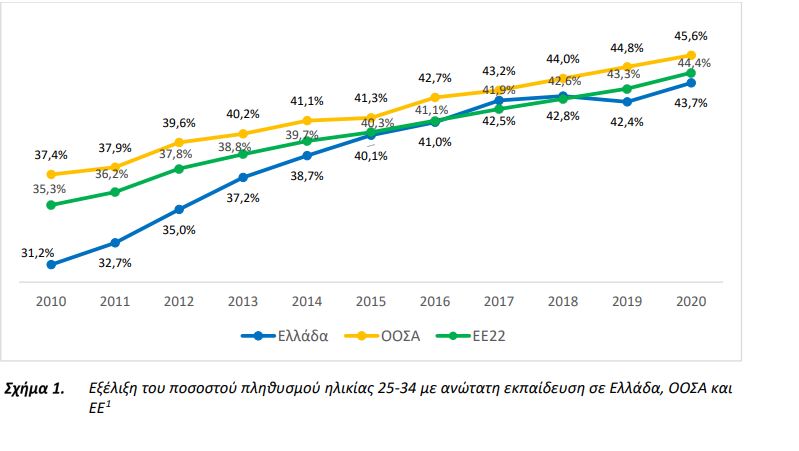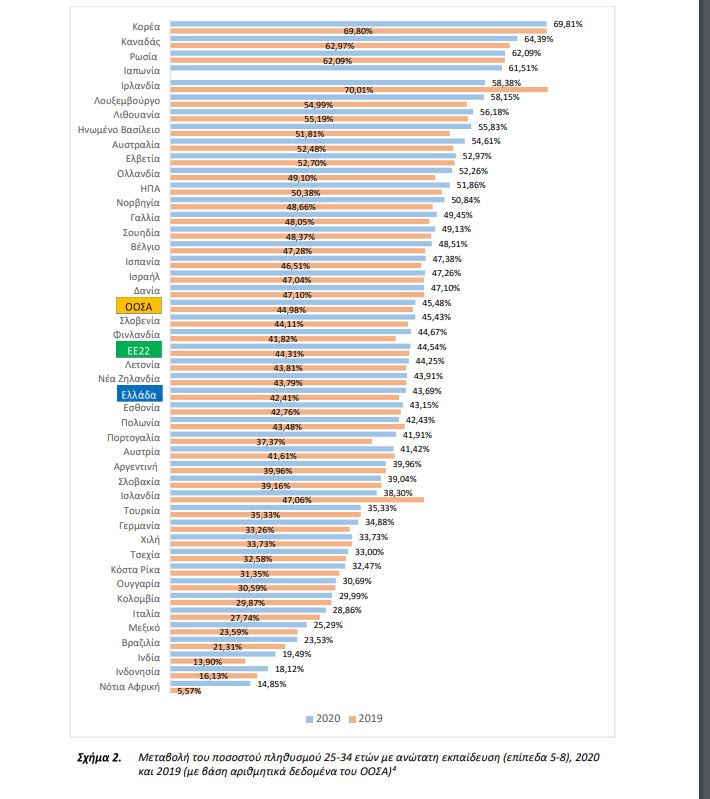
The highest unemployment rate alumni of higher education (ages 25-39) among EU countries, Greece continues to show this, as evidenced by the conclusions of this year’s report of the National Authority for Higher Education (ETHAAE), which was submitted to Parliament. Our country shows an unemployment rate of 17% at these ages and the second highest unemployment rate among the active population (14.7%).
Otherwise, the ETHAAE report, as in previous years, does not delve into the picture and problems of higher education in our country, but presents mostly simple statistics from European or other surveys about the overall picture of higher education institutions at EU and OECD level.
Top 10 worst scores: Who regrets their chosen career
Thus, as the report notes, in some countries it is more difficult for fresh graduates to find a job, and this is noted, for example, in addition to Greece, also in Serbia (11.1% unemployment in the total population, 12.2% unemployment in graduates. 25 -39), and Denmark (5.1% unemployment of the total population, 5.5% unemployment among graduates 25-39).
Of course, in the past five years (2017 – 2021), the unemployment rate for young graduates of higher education, between the ages of 25 and 39, has decreased in the European Union countries. Greece shows the largest decline of all EU countries (-4.9%) but the overall rate of unemployed graduates remains particularly high.
At the same time, the data of the Organization for Economic Co-operation and Development and the Statistical Office of the European Communities show, as stated in the report, that the level of education of the population, internationally, shows an upward trend over time, both at the age of 25-34 and at the age of 25-64 in the OECD countries Economic and development, people between the ages of 25 and 34 have a higher level of education than older people on average.
In terms of gender, female higher education graduates outnumber men and specifically in Greece they outnumber them by 14.38%.
In Greece, the percentage of holders of a higher education degree in the 25-34 age group is close to the OECD average, i.e. 43.69% compared to 45.48% in the OECD. On the contrary, in the 25-64 age group, the percentage of higher education holders drops significantly: 32.74% compared to 40% in the Organization for Economic Co-operation and Development.
Employment of higher education graduates aged 25-34 in Greece has been consistently below the OECD average. The employment rate of higher education graduates aged 25-34 in Greece decreased from 2010 (77%) to 2013 (62.1%) and then increased annually until 2019 (72.8%). In 2020, it dropped to 70.3%, which is much lower than the 77% in 2010. 
In OECD member countries, in 2020, the average employment of fresh graduates was 82.98%, after it registered a slight deterioration compared to the previous year. The Netherlands (91.6%), the United Kingdom (90.6%), Lithuania (90.4%) and Switzerland (90.1%) have the highest employment rates for higher education graduates aged 25-34.
The lowest performer among the OECD member countries is Italy with an employment rate of just 66.7%. It is followed by Greece with an employment rate of 70.3%, lower than Korea (75.2%) and the Czech Republic (76.4%).
Colombia (-7.9%), Costa Rica (-7.5%), Iceland (-6.4%), Australia (-5.2%) showed significant declines in employment of recent higher education graduates, and Brazil (-5.4%). Conversely, except for the significant increase in South Africa (+29.9%), a marginal positive change of less than 1% was recorded in Slovenia, Finland, Austria, the United Kingdom, Switzerland and the Netherlands.
Among the countries with the highest employment rates for higher education graduates (25-64) are Slovenia (90.4%), Lithuania (89.9%), the Netherlands (89.5%), Sweden (89.3%), Norway (89.2%), and Poland (89.1%).
Greece, with 75.4%, ranks last in OECD countries, above Turkey (73.6%) and Saudi Arabia (74%), just below Korea at 77% and far below France at 85% and Italy at 80.8%.
The highest employment rates for holders of higher education degrees are recorded in Norway (90.46%), Lithuania and Slovenia (89.15%), Sweden (89.08%), Japan (88.77%), Switzerland (88.58%), the Netherlands (88.21%) and Russia (88.17%).

“Hipster-friendly coffee fanatic. Subtly charming bacon advocate. Friend of animals everywhere.”






More Stories
North Macedonia: With a double score, Seljanovska won in the first round
Discovery of a giant mass grave 2,200 years old
Putin launches an anti-corruption operation